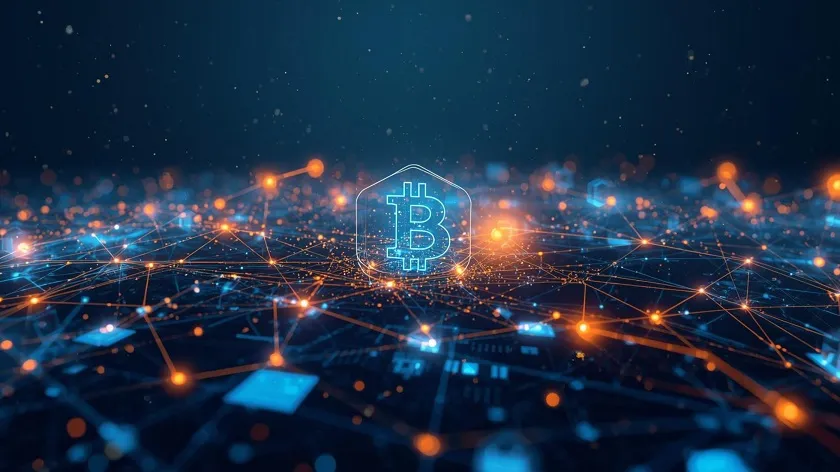🚀 Introduction: A New Era of Trust and Transparency:
Imagine buying a house without piles of paperwork or tracking a product’s journey from factory to your doorstep with complete transparency. That’s the promise of blockchain technology. Once seen only as the backbone of cryptocurrencies like Bitcoin, blockchain is now transforming industries far beyond finance. In 2025 and beyond, two sectors stand out: real estate and supply chains.
Blockchain’s ability to create secure, transparent, and tamper-proof records is changing how we buy property and how goods move across the globe. Let’s explore how this technology is revolutionizing these industries—and what it means for you.
🌍 Blockchain’s Long-Term Potential:
Before diving into real estate and supply chains, it’s important to understand blockchain’s bigger picture.
- Decentralization: No single authority controls the data.
- Transparency: Every transaction is recorded and visible.
- Security: Data is encrypted and nearly impossible to alter.
- Efficiency: Cuts out middlemen, reducing costs and delays.
Long-term, blockchain could become the backbone of global commerce, finance, and even government systems. It’s not just about crypto—it’s about building trust in digital transactions.
🏠 Blockchain in Real Estate:
Buying property has always been complicated, involving lawyers, banks, and endless paperwork. Blockchain simplifies this process by digitizing property records and enabling smart contracts.
Key Benefits:
- Faster Transactions: Smart contracts automatically execute agreements when conditions are met.
- Reduced Fraud: Property titles stored on blockchain are tamper-proof.
- Lower Costs: Fewer intermediaries mean reduced fees.
- Global Access: Investors worldwide can buy fractional shares of properties via tokenization.
Example:
Imagine purchasing a house where the deed is instantly transferred to your digital wallet once payment is confirmed. No waiting weeks for paperwork—just a secure, transparent transaction.
📦 Blockchain in Supply Chains:
Supply chains are complex, often involving multiple countries, companies, and checkpoints. Blockchain brings clarity by recording every step of a product’s journey.
Key Benefits:
- Transparency: Consumers can verify where products come from.
- Efficiency: Reduces delays by streamlining logistics.
- Trust: Prevents counterfeit goods by verifying authenticity.
- Sustainability: Tracks environmental impact and ethical sourcing.
Example:
Think of buying coffee. With blockchain, you could scan a QR code and see the farm where the beans were grown, the shipping route, and the roasting facility—all verified and secure.
✅ Pros and ❌ Cons of Blockchain in Real Estate and Supply Chains
| ✅ Pros | ❌ Cons |
| Increased transparency | High initial setup costs |
| Reduced fraud and errors | Requires industry-wide adoption |
| Faster, cheaper transactions | Regulatory uncertainty |
| Global accessibility | Technical complexity for beginners |
🔐 Security Tips for Using Blockchain Platforms:
While blockchain is secure, users must still protect themselves.
- Use Trusted Platforms: Only trade or invest through reputable exchanges.
- Enable Two-Factor Authentication (2FA): Adds an extra layer of security.
- Store Keys Safely: Keep private keys in hardware wallets, not online.
- Beware of Scams: Avoid offers that sound “too good to be true.”
- Stay Updated: Regularly update wallets and apps to patch vulnerabilities.
🌟 The Future Outlook:
By 2025, blockchain adoption in real estate and supply chains is expected to accelerate:
- Real Estate: Tokenized property investments could open doors for small investors.
- Supply Chains: Global brands may adopt blockchain to prove sustainability and ethical sourcing.
- Integration with AI and IoT: Smart devices could automatically record data on blockchain, making systems even more efficient.
Blockchain isn’t just a buzzword—it’s becoming the foundation of trust in digital transactions.
📊 SEO Keywords to Target:
- Blockchain real estate 2025
- Blockchain supply chain solutions
- Tokenized property investments
- Blockchain transparency in logistics
- Future of blockchain technology
❓ FAQ: Blockchain in Real Estate and Supply Chains
Q1: Can blockchain really prevent fraud in real estate?
Yes. Property titles stored on blockchain are tamper-proof, making fraud much harder.
Q2: How does blockchain improve supply chains?
It records every step of a product’s journey, ensuring transparency and authenticity.
Q3: Is blockchain safe for beginners?
Yes, but beginners should use trusted platforms and follow security tips.
Q4: Will blockchain replace traditional systems?
Not overnight. It will likely complement existing systems before becoming mainstream.
🚀 Final Thoughts & Call-to-Action:
Blockchain is no longer just about Bitcoin—it’s reshaping industries like real estate and supply chains by offering transparency, efficiency, and trust. While challenges remain, the long-term potential is enormous.
👉 Ready to explore blockchain and crypto opportunities? Sign up for Binance today and take your first step into the future of finance and technology.

